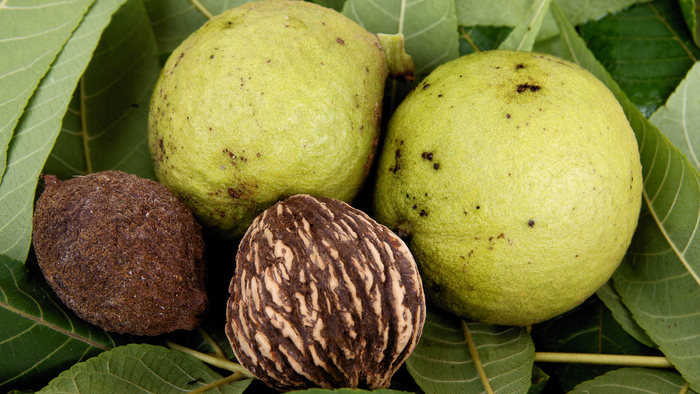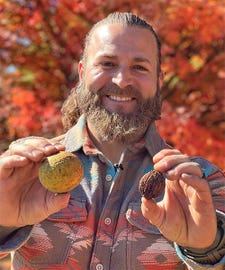Surthrival changes the natural supplement game with ‘wild’ nutrition
Surthrival, co-founded by WildFed TV host Daniel Vitalis, received an Expo East NEXTY Award for its Black Walnut Protein Powder. Read more about the supplement.
February 4, 2024

On the WildFed television show and podcast, host Daniel Vitalis harvests plants and animals, then works with chefs who turn the raw ingredients into delicious, practical foods and beverages.
Vitalis became a speaker and educator in the health-and-wellness space in 2007 and soon teamed up with close friend and business partner LeighLon Anderson—manager of the website, marketing, advertising and back-end systems—to launch Surthrival, a boutique supplement company, in 2008. Fifteen years later, they’re still launching innovative products to a dedicated customer base.
“We started Surthrival to support our customers with the most unique, innovative, and powerful supplements possible,” he says. “We are known for a grade of products that are above the typical quality of run-of-the-mill supplements.”
Boasting bespoke items like premium Colostrum, Elk Antler Velvet, Pine Pollen, and Chaga extracts in its product line, Surthrival won an Expo East 2023 NEXTY Award for Best New Planet-Forward Product for its Black Walnut Protein Powder, which comes from nuts foraged by Americans young and old, from all walks of life, across several states. We spoke with Vitalis to learn more about this unique product and why adding wild foods to your diet is good for both your body and the environment.
 Black walnut fruit with hulled black walnuts. Credit: Canva
Black walnut fruit with hulled black walnuts. Credit: Canva
How did you get into leading a “wild” lifestyle?
Daniel Vitalis: Healthy lifestyle design has been a passion of mine since I was a teenager. My childhood home was an unbalanced and unhealthy place, and I had to learn at an early age how to take care of myself. Learning about healthy eating was a big part of that, and I quickly developed a passion for food. In particular, I became interested in the lifestyle of hunter-gatherers and was very taken by the idea of wild foods. All the foods we find in our modern marketplace have a wild origin and it's my passion to find out what that origin is.
Surthrival is the only supplement company offering carbon dioxide-extracted Black Walnut Protein Powder on the market. What made you decide to produce this product on a mass scale?
DV: On WildFed, we hunt and gather wild foods, then work with chefs to make incredible meals to share with the people who were part of the episode. Through my work in the wild foods space, I connected with Hammons Black Walnuts in Missouri and was blown away by their story. Our partnership on this project was a natural fit for both of our teams.
 Daniel Vitalis, co-founder of Surthrival, also hosts the WildFed TV show and podcast.
Daniel Vitalis, co-founder of Surthrival, also hosts the WildFed TV show and podcast.
What makes black walnut protein different than other kinds of plant-based protein?
DV: From a purely nutritional perspective, wild black walnuts have a higher protein content than other commercial tree nut crops, and so our finished protein powder has—at 17 grams of protein per serving—more protein than other plant-based protein powders.
That’s incredible enough, but the sourcing of this protein powder is where it truly shines. Rather than the agricultural sourcing of other plant-based proteins, using crops that originated in other parts of the world and that rely heavily on fertilizers, irrigation, and other industrial inputs, black walnuts come from wild, native, North American trees. Black walnuts were growing wild here in North America before Europeans—or any humans—arrived here. Purchasing Black Walnut Protein Powder is a vote to keep native wild trees on the landscape, and more of our wildlife's habitat intact!
How do you collect and process the walnuts?
DV: Every autumn our partner, Hammons Black Walnuts, puts out more than 200 “hulling stations” in 13 Midwestern states. These are places where black walnut foragers—just regular folks who have access to black walnut trees—can bring in their harvest. The nuts are put through an industrial “huller” that removes the outer husk, exposing the nut’s shell. Foragers are paid a per-pound rate on these finished nuts.
The nuts are then shelled at Hammons’ Stockton, Missouri, facility. The shells are used for industrial applications like metal polishing—they’ve been used to polish the Statue of Liberty—and the nut meats are sold as food. A portion of those nutmeats go on to become our Black Walnut Protein Powder.
How do you manage the food safety aspect, since you work with many foragers who are handling a wild product?
DV: Black walnuts are protected by an extremely tough shell covered by a thick, fibrous outer husk. This keeps the nut's exterior free from contamination. You can also imagine the tree’s roots, trunk, and branches acting like a huge filter, maintaining the purity of the nuts themselves, which are its fruits. Being a wild crop, they are never exposed to pesticides, herbicides, or fertilizers. All of our finished products are rigorously tested for contaminants, so that’s our final and most significant safety check.
Explain the carbon dioxide-extraction process used to create the product.
DV: CO2 extraction is a much cleaner and lower-temperature extraction process than those typically used in protein manufacturing. For this reason, it’s the preferred method in the medical cannabis industry. CO2 gas is all around us, at about 0.5% of our atmosphere. If compressed it becomes a liquid, which can be used to extract the fat-soluble portion of our black walnuts, much like alcohol is used to make a tincture.
Once the extraction is complete, the pressure is removed and the CO2 returns to its gaseous state, evaporating off and leaving zero residue behind. This process removes the oil from the black walnut, leaving behind the protein fraction that becomes our Black Walnut Protein Powder.
What did it mean to win the NEXTY Award for Best New Planet-Forward Product?
DV: I knew from the moment I tried the first batch of this product that we had something really special, but getting the NEXTY Award was confirmation that the industry could see it too. A product like this, based on a native, wild tree that preserves habitat, needs no agricultural inputs, irrigation or farmland use—and that uses a volunteer-based foraging workforce—represents the implementation of our social and ecological responsibilities. It’s time for more products like this one in the marketplace. I hope it inspires other companies to bring similarly sourced products to market.
What else would you like readers to know about this product or the company?
DV: Surthrival is a small, independent, mission-driven company, that for 15 years has been direct to our consumers. Black Walnut Protein Powder represents our first time bringing a product to a much wider audience. We truly appreciate the incredible reception we’ve received and thank all our customers for their support and encouragement!
Any parting thoughts?
DV: Black Walnut Protein Powder brings a powerful wild food into your diet, and that’s important. But nothing can replace a personal relationship with the natural world. So, I encourage you to get outside. Modern people are losing their connection to nature, and food is the perfect way to cultivate a connection with the natural world.
About the Author(s)
You May Also Like


